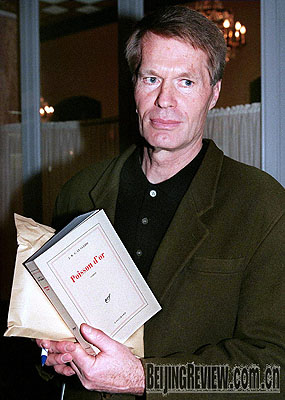|

The name of French writer Jean-Marie Gustave Le Clézio, winner of the 2008 Nobel Prize in Literature, may be unfamiliar to the majority of Chinese readers, but in Chinese literary circles he is a well-known and respected figure.
Almost all the representative works of Le Clézio have been translated into Chinese and published in China, such as Mondo et autres histoires (Lijiang Publishing House, 1992), War (Yilin Press, 1994), The Interrogation (Shanghai Translation Publishing House, 1998), Wandering Star: A Novel (Flower City Publishing House, 1998) and Golden Fish (Baihua Literature and Art Press, 2000).
Chinese connection
In January 2008, the People's Literature Press published his novel Ourania. This work won an award for Yearly Best Foreign Novel in the 21st Century, given by the People's Literature Press and the China Foreign Literature Association. Le Clézio came to Beijing personally to receive this honor.
During that trip, Le Clézio revealed the story of him about the connection to China. He said that in 1967 when France and China resumed their diplomatic relationship, he applied to join the army of French youth that would be dispatched to China under the framework of France-China communication and cooperation.
"I can still remember how anxious I was at that time when I waited for the permission of the French Foreign Ministry," Le Clézio said to the media in Beijing.
But in the end, because of unknown reasons his application was not approved by the French Foreign Ministry, something he regretted.
He later went to China on three occasions. To him, China is the cradle of Eastern thought. He told reporters while in Beijing that he still kept an interest in studying Chinese culture and literature. "Reading Chinese classical literary works and appreciating China's Peking Opera and traditional Chinese paintings have left a deep influence on me," Le Clézio said.
He said that he especially loved reading China's contemporary novels, such as works of Lu Xun (1881-1936), who is called the father of modern Chinese literature, and another contemporary literary master Ba Jin (1904-2005). Lao She (1899-1966), one of the most significant novelists and dramatists in 20th century Chinese literature, is his favorite Chinese writer. Le Clézio said that the depth, passion and humor in the works of Lao She are universal and surpass limitation of boundaries of countries.
Impressed scholars
On hearing the news that Le Clézio had won this year's Nobel Prize, many Chinese scholars who have studied or translated his works expressed their congratulations and said that Le Clézio deserved the honor.
Yu Zhongxian, a scholar of French literature at the Institute of Foreign Languages of the Chinese Academy of Social Sciences, is a big fan of Le Clézio's writing style. In Yu's eyes, the works of Le Clézio have a mysterious quality.
"He likes to describe people that do not conform to modern civilization and love nature. In terms of writing style, Le Clézio is good at weaving different writing skills into one work," Yu told The Beijing News. Yu also said that in the works of Le Clézio he often introduces new forms of writing.
Wu Yuetian, Director of the Office of the Study of Southern Europe and Latin America at the Institute of Foreign Languages, Chinese Academy of Social Sciences, is also not surprised that Le Clézio won the prize as his works first became popular in the 1970s and have stood the test of time.
"I remember when he was in Beijing in January, I asked him when he would retire, and he said that he would write till the last minute of his life," Wu said in The Beijing News.
Wu added that Le Clézio pays great attention to the award that China gave to him in January, as he is conscious of the fact that China has the most readers in the world.
Chinese translators are also big fans of Le Clézio's works. Jin Longge, translator of Le Clézio's novel Mondo et autres histoires, wrote in one of his blogs that he thought in the past that Le Clézio could win the Nobel Prize one day, and now his prediction has come true.
"Le Clézio is an intense writer, and his language style is beautiful, simple and precise," Jin said in his blog.
Le Clézio has long been a writer with a serious creative attitude in the eyes of Yuan Youyi, the translator of Le Clézio's novel Wandering Star: A Novel. "His works cannot be classified in any genre and he does not write just to show his writing skills," said Yuan in The Beijing News.
Xu Jun, Deputy Director of the School of Postgraduates at Nanjing University, who has translated several works of Le Clézio, said that a common theme of the works of Le Clézio is about the yearning for the ancient civilization and criticism of the over emphasis on materialism in modern civilization, which is part of the critical approach French have to society. "He inherited the spirit of French independent intellectuals," Xu said in a recent article in china.org.cn, a Beijing-based website.
Many media organizations forecast that Le Clézio will be more popular in China after winning the Nobel Prize as quite a number publishing houses have said that they would republish the works of Le Clézio or sign new copyright contracts with the writer.
Zhao Wuping, who is in charge of the copyright discussions of the Shanghai Translation Publishing House, said in the Beijing-based 21st Century English Education Weekly, that they will soon republish the novel The Interrogation with a new design, and the impression is expected to be 30,000 to 50,000 copies.
Zhao is very confident about the market performance of the books of Le Clézio in China, saying that the plots of most works of the writer are dramatic, and many of his works focus on persons in the margin of society, which would be liked by young readers. | 